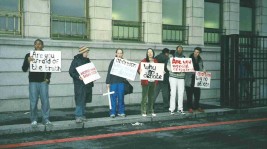Radio interviews, public service announcements and phone in debates are effective ways of reaching a very large audience at little or no cost. It is worth learning the skills.
Getting started
Speaking on radio does require a little courage to start, but gets easier with time. Begin with an easy sympathetic interviewer on a subject you know a lot about. Later on, you can move to a more hostile interviewer. Listen carefully to other people on radio and try to copy what they do well.
Brief your host beforehand
- Give your interview host summary background information on the topic you will be talking on.
- Give them suggestions on the type of questions they can ask you.
- Arrive early to chat to your host.
- Help your host find other experts they can phone to add to the discussion.
Studio technical knowledge
- Keep your mouth about a fist away from the microphone.
- Lights in the studio indicate when you are ‘live’ on air. While music is being played, you can chat informally, but watch the lights carefully.
- Bring your notes and background information into the studio – since no-one can see you. Refer to your notes, but don’t read them – because that would make you sound boring.
- Often, shorter radio interviews are done by telephone. The sound quality is poorer, but it can save the time of travelling to and from the studio.
Interviewing technique
- Keep eye contact with your interviewer and smile, because it affects the warmth of your voice.
- If your interviewer asks a question that is off the topic you want to talk about, then give them a very short comment and link it to the topic you do want to talk about.
Public service radio adverts
- Compile a short advert to promote your cause of 30 seconds to 2 minutes. The shorter and better it is, the more often they will play it.
- Find someone good with sound to add background music or effects before or after your words.
- Perfect your script and get others to check to ensure no confusion.
Phoning in to debates
- Most people are afraid to phone in to radio discussions, so those who do have a lot of influence.
- Write down one or two points that have not yet been made by previous callers.
News interviews
- Decide what you will say to the press beforehand. Ensure you can say it all in under a minute. If you make it longer, your words may be cut to say something you didn’t mean.


